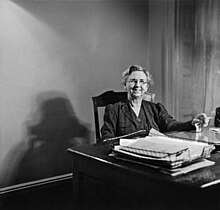This article's use of external links may not follow Wikipedia's policies or guidelines. (August 2020) |
Caroline Pratt | |
|---|---|
 Caroline Pratt at her desk. Photographer and date unknown, perhaps mid-1920s. | |
| Born | May 13, 1867 Fayetteville, New York, New York |
| Died | June 6, 1954 (aged 87) New York, New York, USA |
| Education | Teachers College, Columbia University, Bachelor of Pedagogy, 1892–1894 |
| Occupation(s) | founder, City and Country School; educator |
| Parent(s) | Henry Pratt Lydia (Rowley) Pratt |
| Relatives | Elizabeth Sophia (sister), John Davis (brother), Henry Rowley (brother), Helen Marot (companion) |
Caroline Pratt (May 13, 1867 – June 6, 1954[1] ) was an American social thinker and progressive educational reformer whose ideas were influential in educational reform, policy, and practice.[2]
Pratt is known as the founder of City and Country School in the Greenwich Village section of the borough of Manhattan in New York City; the inventor of unit blocks;[3][4][5] and as the author of I Learn from Children (HarperCollins, 1948; rereleased in 1990; republished by Grove Atlantic in May 2014; released as a free audiobook in 2018 through Audible), an autobiographical account of her life and educational experiments, philosophies and practices. Pratt's specific style of progressive education, focused on first-hand experiences, open-ended materials, and social studies, has been cited and described by figures as noted as John Dewey[6] and the architect and playground designer David Rockwell.[7] Her original vision endures at City and Country School, which she founded in 1914 in the Greenwich Village section of New York City.[8][9]
- ^ "Caroline Pratt, Educator, Dead". The New York Times. June 7, 1954.
- ^ Hauser, Mary E. (2006). Learning from Children: The Life and Legacy of Caroline Pratt. New York: Peter Lang. pp. 141–144. ISBN 0820467510.
- ^ New, Rebecca; Cochran, Moncrieff (2008). Early Childhood Education: An International Encyclopedia. Vol. 3. Greenwood Publishing Group. p. 653. ISBN 978-0313331039.
- ^ "communityplaythings.com - Our History". www.communityplaythings.com. Retrieved 2017-06-24.
- ^ Hauser, Mary E. (2006). Learning from Children: The Life and Legacy of Caroline Pratt. New York: Peter Lang. p. 144. ISBN 0820467510.
- ^ Dewey, John (1915). Schools of To-morrow. E.P. Dutton. pp. 116–119.
- ^ "Imagination Playground". Who Did You Consult With On This Project?. Imagination Playground.
- ^ Bickman, Martin (July 20, 2004). "Won't You Come Home, John Dewey?". Los Angeles Times.
- ^ Spencer, Kyle (November 27, 2011). "With Building Blocks, Educators Go Back to Basics". New York Times.